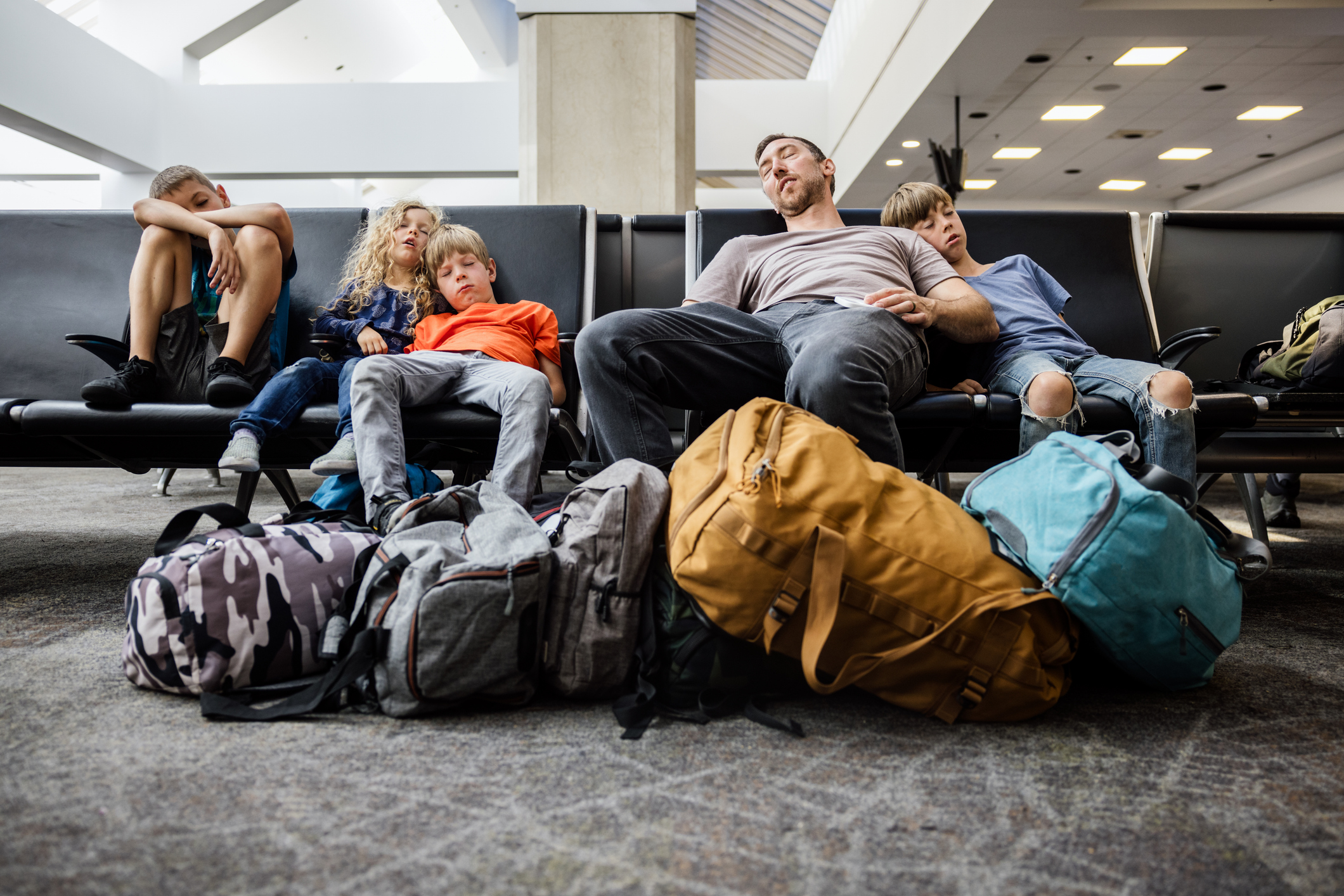6 Expensive Travel Mistakes and How to Avoid Them
Whether it's forgetting travel insurance or paying unnecessary luggage fees, here's how to avoid these costly mistakes.

Alexandra Svokos
Profit and prosper with the best of Kiplinger's advice on investing, taxes, retirement, personal finance and much more. Delivered daily. Enter your email in the box and click Sign Me Up.
You are now subscribed
Your newsletter sign-up was successful
Want to add more newsletters?

Delivered daily
Kiplinger Today
Profit and prosper with the best of Kiplinger's advice on investing, taxes, retirement, personal finance and much more delivered daily. Smart money moves start here.

Sent five days a week
Kiplinger A Step Ahead
Get practical help to make better financial decisions in your everyday life, from spending to savings on top deals.

Delivered daily
Kiplinger Closing Bell
Get today's biggest financial and investing headlines delivered to your inbox every day the U.S. stock market is open.

Sent twice a week
Kiplinger Adviser Intel
Financial pros across the country share best practices and fresh tactics to preserve and grow your wealth.

Delivered weekly
Kiplinger Tax Tips
Trim your federal and state tax bills with practical tax-planning and tax-cutting strategies.

Sent twice a week
Kiplinger Retirement Tips
Your twice-a-week guide to planning and enjoying a financially secure and richly rewarding retirement

Sent bimonthly.
Kiplinger Adviser Angle
Insights for advisers, wealth managers and other financial professionals.

Sent twice a week
Kiplinger Investing Weekly
Your twice-a-week roundup of promising stocks, funds, companies and industries you should consider, ones you should avoid, and why.

Sent weekly for six weeks
Kiplinger Invest for Retirement
Your step-by-step six-part series on how to invest for retirement, from devising a successful strategy to exactly which investments to choose.

Even the most seasoned tourists can make travel mistakes when planning a vacation. Some blunders can be minor infractions, but others can cost travelers a lot of money and heartache.
But there are steps you can take to avoid travel mistakes. Here are six slip-ups that travelers might make this year, plus tips on how to avoid them.
1. Forgetting travel medical insurance
Christopher Elliott, a consumer advocate and founder of the nonprofit Elliott Advocacy, says many people don't consider purchasing travel medical insurance.
From just $107.88 $24.99 for Kiplinger Personal Finance
Become a smarter, better informed investor. Subscribe from just $107.88 $24.99, plus get up to 4 Special Issues

Sign up for Kiplinger’s Free Newsletters
Profit and prosper with the best of expert advice on investing, taxes, retirement, personal finance and more - straight to your e-mail.
Profit and prosper with the best of expert advice - straight to your e-mail.
"People often think nothing bad will happen before or on their vacation, but then they get injured overseas and need to go to the hospital, and the next thing they're looking at is a $10,000 hospital bill."
Nearly one in four Americans report they've experienced a medical issue while traveling abroad, according to a 2023 survey sponsored by GeoBlue, an international health insurance company.
Unfortunately, most U.S. health care plans — including employer group plans, Medicare and Affordable Care Act plans — offer limited or no medical coverage outside the U.S.
How to avoid: One solution is to purchase a travel medical insurance policy, a type of insurance that provides coverage for a range of medical emergencies while traveling abroad, from minor injuries to major events such as heart attacks and strokes, to medical evacuation and emergency transport in the case of severe emergencies.
Travelers spend on average $103 per policy on Squaremouth, a travel insurance comparison website, with an average trip length of 20 days. Squaremouth advises international travelers to obtain a policy that provides a minimum of $50,000 in emergency medical coverage and at least $100,000 in medical evacuation coverage.
Some travel insurance policies cover emergency medical coverage and medical evacuation coverage up to certain limits.
Faye Insurance offers travel insurance with 100% digital claims and real-time support.
Explore plans at www.withfaye.com.
2. Paying unnecessary luggage fees
You might have heard that a number of airlines — including Southwest Airlines, American Airlines, Delta and JetBlue Airways — raised their prices for checked bags in the last few years. But one thing a lot of travelers aren't aware of is that some airlines charge customers more if they check a bag at the airport vs paying to check a bag in advance.
For instance, JetBlue customers flying within the U.S., Latin America, the Caribbean and Canada can save up to $20 on their first two checked bags ($10 savings per bag) when they add them to their flight reservation at least 24 hours before departure.
How to avoid: Make sure to pay ahead of time for any bags that you plan to check.
3. Getting hit by hidden hotel and rental fees
Wi-Fi fees, early check-in fees, gym fees — hotels today charge guests no shortage of extra fees and surcharges. It's a widespread problem: Nearly four out of 10 (37%) U.S. adults said they had experienced a hidden or unexpected hotel fee in the previous two years in a 2023 survey (PDF) by Consumer Reports.
Meanwhile, Airbnb, VRBO and other rental property companies often tack on extra fees, such as for cleaning, additional guests beyond a certain number and other service fees. These additional costs can add hundreds of dollars to your bill.
How to avoid: Many hotels offer to reduce or, in some cases, waive certain fees to guests who join their loyalty program, which is free in most cases. Also, sometimes simply asking an employee at check-in to waive certain fees could do the trick.
As of April 2025, Airbnb now shows the total fees before taxes when you search for a place to rent. Similarly, VRBO shows "upfront pricing" of total fees, including service fees, before taxes and optional extras when you search.
In general, hidden fees should now be less of a problem since the Federal Trade Commission instituted a rule prohibiting hidden "junk fees" for live events and short-term lodging. The rule was put in place by FTC Chair Lina M. Khan and went into effect in May 2025.
Even so, you should remember two points: One, that you should book directly through the hotel or rental company, not through a third-party, to ensure you're seeing the full costs (and because your trip is typically better secured that way); and two, that you should stay vigilant to hidden fees and speak up when you see them.
This 20-inch carry-on features a built-in USB port to keep your devices charged and a handy cup holder for your airport coffee.
4. Paying full price for car rentals
First, the good news: Since hitting all-time highs in 2021, rental car prices have dropped, according to Nerdwallet. Even so, rental car prices have jumped since before the pandemic.
This is also another space where you need to keep an eye on add-ons and extra fees. For example, as Kiplinger personal finance writer Rachael Green has explained, "most people can safely decline" supplemental coverage, since your regular car insurance likely applies to a rental car in the U.S., and many travel credit cards offer rental car protection through the card.
How to avoid: There are several ways you can avoid paying full price. Big-box stores such as Costco, BJ's and Sam’s Club provide their members discounts on certain rental cars. AARP and AAA also offer their members discounted rates. Finally, consult third-party sites such as Expedia or Booking.com for deals — but be aware, as mentioned with hotels and rental properties, that when you book through a third-party, you might have less flexibility with changing or canceling your booking.
- AARP members save up to 35% on base rates at Avis and Budget.
- AAA members save up to 20% on Hertz rentals.
- In addition, a number of credit card companies offer certain cardholders discounts when they book a vehicle from specific rental car companies.
You might also be able to nab a lower rate for your car rental by prepaying when you book a reservation. Some rental car companies offer limited-mileage plans at a lower cost, which could be a good option if you're planning to take just a short trip.
5. Missing surprises on the bill

Especially these days, when everything has gone digital, it can feel easy to simply walk out of a hotel without talking to someone at the front desk when you're checking out. If you're not checking the bill before leaving, you could miss charges you don't want to pay.
Kiplinger digital managing editor Alexandra Svokos, for instance, once caught a hotel restaurant meal she didn't get charged to her room. Because she reviewed the bill at checkout before paying, the front desk staff was able to pull up a copy of the lunch receipt and see it had someone else's name on it, and they quickly removed it from her bill, solving the issue.
This also applies to catching tacked-on fees when picking up a rental car or booking an excursion.
How to avoid: Stop at the front desk before you leave a hotel and ask to see a copy of the bill. This only takes a few minutes and could save you a hassle if you catch a mistaken charge on an electronic receipt after you've left and paid the hotel.
To avoid unnecessary fees when renting a car, you should always review the list of charges before you accept the keys to a rental car. By doing that, Svokos has caught and avoided tacked-on fees when picking up a car both domestically and internationally.
She also recommends simply asking the rental car desk agent what you really need. For example, she says, "I've asked the desk agent if the prepaid toll fee was worth it based on where I would be driving, and they've told me honestly when it wasn't."
6. Not joining the loyalty club
This last mistake is another easy step to skip that could be costing you.
Most airlines and hotels have frequent flyer or loyalty clubs where you collect miles or points from your bookings. You can then use those points towards future trips. Additionally, many of these loyalty clubs offer automatic discounts when booking.
You can attain status levels with these clubs when you book a certain amount within a year, and those status levels give you discounts and freebies such as upgrades and discounted checked-bag or change fees.
Even if you're only traveling with a given airline or hotel once or twice in a year, it's worth it to sign up for these clubs and make sure that your bookings are linked to your loyalty number.
Frequently, miles and points don't expire, so you can accumulate them slowly over time. Many airlines and hotels also allow you to transfer points between each other and between rewards credit cards, so you can combine credits to save money on a booking.
How to avoid: When booking a hotel or flight online, sign in as a member. Joining these loyalty clubs is typically free. If you don't know if you have an account, there are ways to check on companies' sites. It can help to store loyalty information in a password manager such as 1Password.
If you have a loyalty account, make sure it's linked to the booking by signing in when you book. Hotel companies often have many different brands under their umbrellas, so that stay at the Waldorf Astoria counts towards your Hilton points.
Bonus tip: Airlines have "alliances" that share points, so if you have a United account but you need to book an Aegean flight to get to Santorini, that Aegean flight will earn you United miles, since both airlines are in the Star Alliance. If you're booking through Aegean, you need to enter your United loyalty number to earn those miles.
When you book a flight online, there's an option to add your frequent-flyer or loyalty number. Check if the airline is in an alliance with your frequent flyer airline and add that number when you book. You also have the option to link the loyalty number later or after the fact. How that looks differs based on the airline.
Related Content
Profit and prosper with the best of Kiplinger's advice on investing, taxes, retirement, personal finance and much more. Delivered daily. Enter your email in the box and click Sign Me Up.

Daniel Bortz is the Personal Finance Editor at AARP and is based in Arlington, Va. His freelance work has been published by The New York Times, The Washington Post, Consumer Reports, Newsweek, and Money magazine, among others.
- Alexandra SvokosDigital Managing Editor
-
 Quiz: Do You Know How to Avoid the "Medigap Trap?"
Quiz: Do You Know How to Avoid the "Medigap Trap?"Quiz Test your basic knowledge of the "Medigap Trap" in our quick quiz.
-
 5 Top Tax-Efficient Mutual Funds for Smarter Investing
5 Top Tax-Efficient Mutual Funds for Smarter InvestingMutual funds are many things, but "tax-friendly" usually isn't one of them. These are the exceptions.
-
 AI Sparks Existential Crisis for Software Stocks
AI Sparks Existential Crisis for Software StocksThe Kiplinger Letter Fears that SaaS subscription software could be rendered obsolete by artificial intelligence make investors jittery.
-
 One of the Most Powerful Wealth-Building Moves a Woman Can Make: A Midcareer Pivot
One of the Most Powerful Wealth-Building Moves a Woman Can Make: A Midcareer PivotIf it feels like you can't sustain what you're doing for the next 20 years, it's time for an honest look at what's draining you and what energizes you.
-
 I'm a Wealth Adviser Obsessed With Mahjong: Here Are 8 Ways It Can Teach Us How to Manage Our Money
I'm a Wealth Adviser Obsessed With Mahjong: Here Are 8 Ways It Can Teach Us How to Manage Our MoneyThis increasingly popular Chinese game can teach us not only how to help manage our money but also how important it is to connect with other people.
-
 Looking for a Financial Book That Won't Put Your Young Adult to Sleep? This One Makes 'Cents'
Looking for a Financial Book That Won't Put Your Young Adult to Sleep? This One Makes 'Cents'"Wealth Your Way" by Cosmo DeStefano offers a highly accessible guide for young adults and their parents on building wealth through simple, consistent habits.
-
 My Spouse and I Are Saving Money for a Down Payment on a House. Which Savings Account is the Best Way to Reach Our Goal?
My Spouse and I Are Saving Money for a Down Payment on a House. Which Savings Account is the Best Way to Reach Our Goal?Learn how timing matters when it comes to choosing the right account.
-
 We're 78 and Want to Use Our 2026 RMD to Treat Our Kids and Grandkids to a Vacation. How Should We Approach This?
We're 78 and Want to Use Our 2026 RMD to Treat Our Kids and Grandkids to a Vacation. How Should We Approach This?An extended family vacation can be a fun and bonding experience if planned well. Here are tips from travel experts.
-
 My First $1 Million: Retired From Real Estate, 75, San Francisco
My First $1 Million: Retired From Real Estate, 75, San FranciscoEver wonder how someone who's made a million dollars or more did it? Kiplinger's My First $1 Million series uncovers the answers.
-
 To Love, Honor and Make Financial Decisions as Equal Partners
To Love, Honor and Make Financial Decisions as Equal PartnersEnsuring both partners are engaged in financial decisions isn't just about fairness — it's a risk-management strategy that protects against costly crises.
-
 Top 5 Career Lessons From the 2026 Winter Olympics (So Far)
Top 5 Career Lessons From the 2026 Winter Olympics (So Far)Five lessons to learn from the 2026 Winter Olympics for your career and finances.

